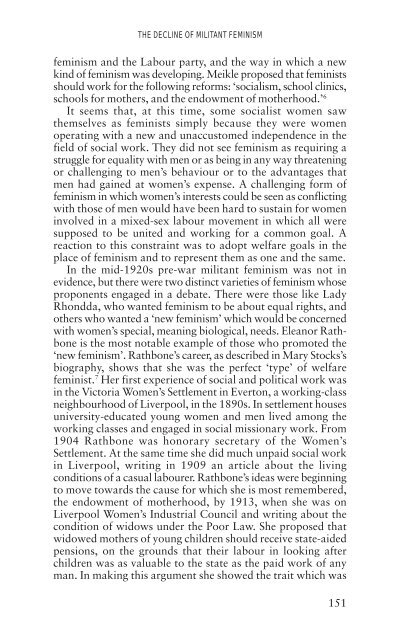The Spinster and Her Enemies - Feminish
The Spinster and Her Enemies - Feminish
The Spinster and Her Enemies - Feminish
Create successful ePaper yourself
Turn your PDF publications into a flip-book with our unique Google optimized e-Paper software.
THE DECLINE OF MILITANT FEMINISM<br />
feminism <strong>and</strong> the Labour party, <strong>and</strong> the way in which a new<br />
kind of feminism was developing. Meikle proposed that feminists<br />
should work for the following reforms: ‘socialism, school clinics,<br />
schools for mothers, <strong>and</strong> the endowment of motherhood.’ 6<br />
It seems that, at this time, some socialist women saw<br />
themselves as feminists simply because they were women<br />
operating with a new <strong>and</strong> unaccustomed independence in the<br />
field of social work. <strong>The</strong>y did not see feminism as requiring a<br />
struggle for equality with men or as being in any way threatening<br />
or challenging to men’s behaviour or to the advantages that<br />
men had gained at women’s expense. A challenging form of<br />
feminism in which women’s interests could be seen as conflicting<br />
with those of men would have been hard to sustain for women<br />
involved in a mixed-sex labour movement in which all were<br />
supposed to be united <strong>and</strong> working for a common goal. A<br />
reaction to this constraint was to adopt welfare goals in the<br />
place of feminism <strong>and</strong> to represent them as one <strong>and</strong> the same.<br />
In the mid-1920s pre-war militant feminism was not in<br />
evidence, but there were two distinct varieties of feminism whose<br />
proponents engaged in a debate. <strong>The</strong>re were those like Lady<br />
Rhondda, who wanted feminism to be about equal rights, <strong>and</strong><br />
others who wanted a ‘new feminism’ which would be concerned<br />
with women’s special, meaning biological, needs. Eleanor Rathbone<br />
is the most notable example of those who promoted the<br />
‘new feminism’. Rathbone’s career, as described in Mary Stocks’s<br />
biography, shows that she was the perfect ‘type’ of welfare<br />
feminist. 7 <strong>Her</strong> first experience of social <strong>and</strong> political work was<br />
in the Victoria Women’s Settlement in Everton, a working-class<br />
neighbourhood of Liverpool, in the 1890s. In settlement houses<br />
university-educated young women <strong>and</strong> men lived among the<br />
working classes <strong>and</strong> engaged in social missionary work. From<br />
1904 Rathbone was honorary secretary of the Women’s<br />
Settlement. At the same time she did much unpaid social work<br />
in Liverpool, writing in 1909 an article about the living<br />
conditions of a casual labourer. Rathbone’s ideas were beginning<br />
to move towards the cause for which she is most remembered,<br />
the endowment of motherhood, by 1913, when she was on<br />
Liverpool Women’s Industrial Council <strong>and</strong> writing about the<br />
condition of widows under the Poor Law. She proposed that<br />
widowed mothers of young children should receive state-aided<br />
pensions, on the grounds that their labour in looking after<br />
children was as valuable to the state as the paid work of any<br />
man. In making this argument she showed the trait which was<br />
151

















